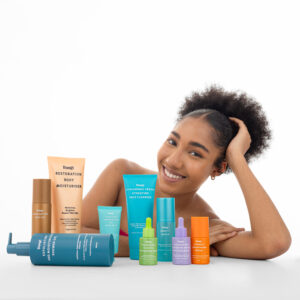
Free Shipping on Orders Over N200,0000 within Lagos
Buy 300k and get 20% off any spa service
Free Shipping For Orders over $150
Free Shipping For Orders over £100
Mineral sunscreen vs Chemical sunscreen, which is better? It’s time to put an end to this age-long battle. You’ve probably heard a dermatologist say chemical sunscreen is better for your skin than mineral sunscreen.
At the same time, you’ve heard that mineral sunscreen is better. Now, you’re confused about which one offers better protection for your skin.
We got you! In this post, our dermatologists share expert insights into this question. They provide insight into the differences between both sunscreens and the unique benefits each sunscreen offers.
Mineral sunscreens create a physical barrier on the skin, reflecting UV rays, and are suitable for sensitive and acne-prone skin. They are environmentally friendly and safe for all skin types but may need frequent reapplication.
Chemical sunscreens absorb UV rays, are lightweight, and don’t leave a white film but can irritate sensitive skin and may require frequent reapplication. The choice between mineral and chemical sunscreen depends on your skin type and lifestyle needs.
Asking if mineral sunscreen is better than chemical sunscreen is like comparing apples and oranges to ask which is better. Both mineral and chemical sunscreens serve the essential purpose of protecting your skin from harmful UV rays but do so in different ways.
Mineral sunscreens act like a shield, reflecting UV rays away from your skin. Chemical sunscreens, on the other hand, work like a sponge, absorbing UV rays and converting them into heat.
Ultimately, it’s not about which one is better overall, but which one suits your skin type and lifestyle the best. As we dive deeper into each type of sunscreen, you’ll understand which one is better for you.
Mineral sunscreens are mineral-based sunscreens with active ingredients like zinc oxide and titanium dioxide. How do they work to protect your skin?
You see when applied directly onto your face, the sunscreen sits on top of the skin, instead of melting into the skin. This way, the sunscreen acts as a physical barrier that shields your skin from harmful UV light.
Put simply, the mineral components contained in mineral sunscreen form a protective layer on the skin that prevents UV rays from penetrating the skin. Hence, they’re also called physical sunscreen.
This is sunscreen formulated with carbon-based chemical components. It offers sun protection by absorbing UV rays into the skin, turning it to heat, which is then released out of the skin.
Due to the nature of how they work (being absorbed into the skin), they often leave an invincible and glossy finish, unlike mineral sunscreen.
Pros
Cons
Pros
Cons
If you have oily skin, choosing the right sunscreen can make all the difference. We recommend opting for a non-greasy, no-white cast lightweight mineral sunscreen.
Mineral sunscreens with ingredients like zinc oxide and titanium dioxide are excellent for oily skin because they sit on top of the skin and absorb excess oil. Look for formulations labelled as “matte finish” or “oil-free” to keep your skin looking fresh and shine-free throughout the day.
For dry skin, hydration is key. As such, we suggest using a chemical sunscreen that also has moisturizing properties.
Chemical sunscreens with ingredients like avobenzone, octinoxate, and oxybenzone absorb into the skin, allowing for a more hydrating experience.
Additionally, look for sunscreens that contain moisturizing agents such as hyaluronic acid, glycerin, or ceramides. These ingredients help to lock in moisture, keeping your skin hydrated and preventing dryness and flakiness.
Sensitive or acne-prone skin requires a gentle touch. We recommend using a non-greasy mineral sunscreen that is free from potential irritants.
Mineral sunscreens with zinc oxide and titanium dioxide are less likely to cause irritation or breakouts because they act as physical barriers rather than absorbing into the skin.
Look for products that are labelled “non-comedogenic,” meaning they won’t clog pores. Additionally, fragrance-free and hypoallergenic formulations can further minimize the risk of irritation and acne flare-ups.
By following these recommendations, you can find a sunscreen that not only protects your skin from harmful UV rays but also caters to your specific skin type needs. Remember, the right sunscreen can make a significant difference in the health and appearance of your skin.
In conclusion, both mineral and chemical sunscreens offer unique benefits and potential drawbacks. The best choice depends on your skin type, lifestyle, and personal preferences.
By understanding how each type of sunscreen works and considering your specific needs, you can make an informed decision that ensures optimal protection from harmful UV rays.
Remember, the most effective sunscreen is one that you will use consistently. Prioritize your skin’s health by selecting a sunscreen that fits seamlessly into your daily routine and provides the protection you need to maintain healthy, radiant skin.
When you fail to wash off your mineral sunscreen at the end of the day, you risk irritation and break out. Mineral sunscreens are designed to form a physical barrier on the skin to reflect UV rays.
They remain on the surface of your skin. This means they can trap dirt and oil on your face which could eventually get underneath your skin, clog your pores and cause irritation. Therefore, they need to be removed through thorough cleansing.
It’s okay to skip applying your sunscreen without moisturising. However, this is not a good long-term practice, as both a moisturiser and sunscreen are important for optimised skincare benefits. So, we don’t recommend replacing your moisturizer with sunscreen.
Your moisturizer should come first before applying your sunscreen.
Mineral sunscreen is ideal for oily skin. Mineral sunscreens are often fragrance-free, lightweight, and contain fewer irritants, making them suitable for sensitive, oily skin.
There’s no one correct way to apply sunscreen on your face correctly. However, the two-finger application method can guide you. With this method, spread the sunscreen on your index and middle finger, from the top to the end of your finger. Rub evenly across your face, neck, and ears.
Mineral sunscreens contain fewer irritants making them less likely to cause inflammation and perfect for acne-prone skin.
You should typically wait 2-4 minutes for your skin to absorb the moisturizer before applying sunscreen.
Yes, you can apply powder after your sunscreen. However, ensure to wait a few minutes for your skin to absorb the sunscreen before applying powder.




